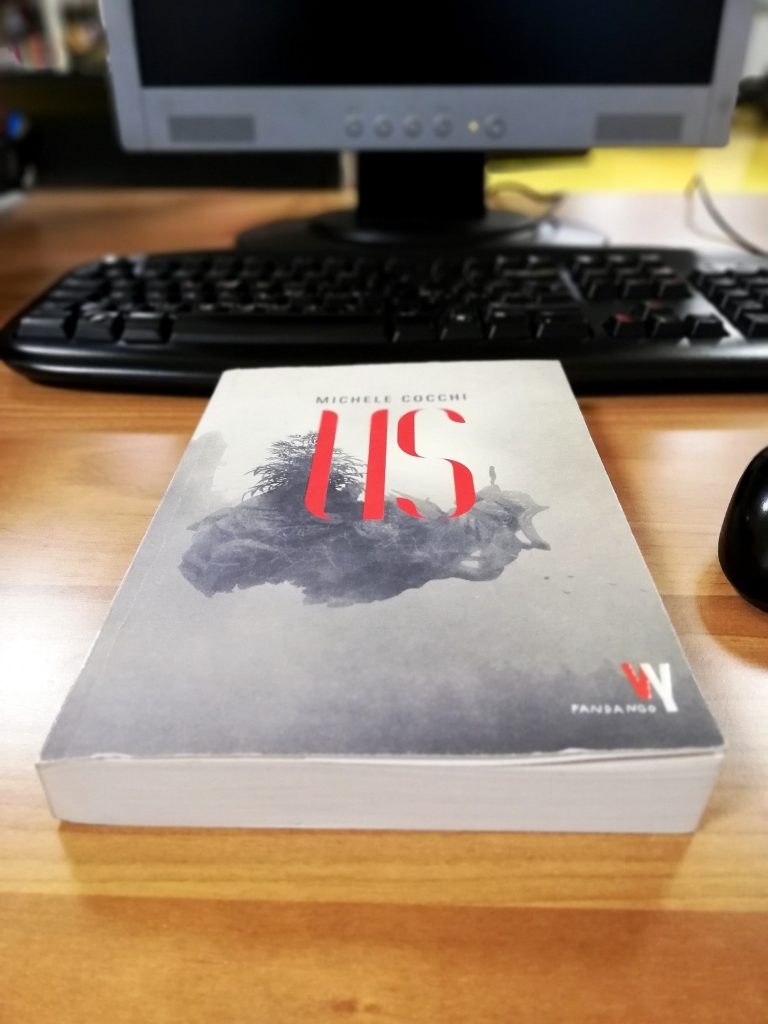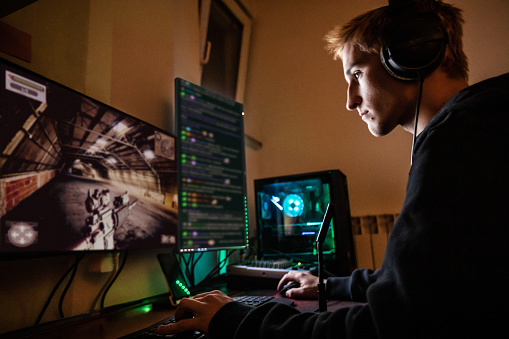US di Michele Cocchi è un libro particolarmente interessante che offre numerosi spunti di riflessione.
Tommaso, uno dei protagonisti, è un hikikomori che ha deciso di rinchiudersi in casa per libera scelta alla ricerca di un sé che prevede inevitabili scontri con l’ambiente circostante e con le persone a lui più vicine. L’atto estremo di Tommaso sembra la sola via per sfuggire alle aspettative sociali. La sua principale attività è giocare a US, un videogioco il cui scopo è portare a termine nell’arco di un anno cento missioni che si svolgono in momenti cruciali della storia del ‘900. Le squadre sono composte da tre elementi e vince il gioco la squadra che riesce a completarle tutte senza mai separarsi.

Durante le missioni i giocatori sono obbligati a schierarsi dalla parte del bene o del male in una sfida che sembra diventare ogni volta qualcosa di più di un semplice videogioco.
La partecipazione a US ha un ruolo fondamentale nella crescita dei protagonisti, gli da accesso alla storia, alla comprensione della dicotomia bene/male, diventa un luogo in cui sperimentare le diverse posizioni ideologiche.
Il gioco aiuta i tre ragazzi a fare squadra, ad imparare a superare le debolezze individuali tramite la forza collettiva e a fidarsi gli uni degli altri.
Michele Cocchi riesce a raccontare il valore dei videogiochi in termini di socializzazione, cooperazione, sperimentazione delle proprie capacità, riflessione personale sul mondo, identificazione con l’altro e a mostrare che può esserci un rapporto tra gaming e crescita, ribaltando i pregiudizi che ritengono invece il gioco, la tecnologia e l’immaginario in grado di creare soltanto mondi alternativi in cui perdere la propria individualità e vivere alienanti dinamiche relazionali.
Parallelamente, tra le diverse sessioni di gioco, partecipiamo alla vita “reale” di Tommaso che si dimena tra le ansie di una madre che riesce a malapena e in malo modo a comunicare con il figlio, e il lassismo di un padre che pensa che prima o poi, semplicemente, gli passerà. Genitori che però avrebbero dovuto interessarsi alle sue cose un po’ prima. E sempre di più iniziamo a condividere con lui il bisogno di isolamento e l’incompatibilità con i membri della sua famiglia.
In qualche modo la condizione di hikikomori con il procedere della lettura tende a marginalizzarsi e ad essere assorbita dal racconto accurato delle missioni e dai rapporti tra Tommaso, la famiglia e i suoi compagni di gioco.
La natura umana è fatta per interagire nella finzione così come nella realtà e anche se in US è vietato parlare di sé, dire il proprio vero nome, raccontarsi, il bisogno di instaurare dei rapporti emerge prepotentemente, tanto che Tommaso alla fine si troverà a vivere delle “missioni” con i suoi nuovi amici anche fuori dal gioco.
Un romanzo piacevole e coinvolgente, scritto con competenza e accuratezza, che aiuta a “comprendere” come spesso la realtà supera la finzione e che il noi è tutto quello che ci serve.
Francesca Capone
US, when the virtual becomes real
US by Michele Cocchi is a particularly interesting book that offers numerous food for thought.
Tommaso, one of the protagonists, is a hikikomori who decided to shut himself up at home by free choice in search of a self that foresees inevitable clashes with the surrounding environment and with the people closest to him. Tommaso’s extreme act seems to be the only way to escape social expectations. His main activity is playing US, a video game whose purpose is to complete one hundred missions in the space of one year taking place at crucial moments in the history of the 20th century. The teams are made up of three elements and the team, that manages to complete them all without ever separating, wins the game.
During the missions, players are forced to take the side of Good or Evil in a challenge that seems to become more than just a video game each time.
Taking part in US plays a fundamental role in the growth of the protagonists. It provides access to history, to the understanding of Good and Evil dichotomy. Hence it becomes a place of trial with different ideological positions.
The game helps the three boys to team up, to learn how overcome individual weaknesses through collective strength and to trust each other.
Michele Cocchi manages to express the value of video games in terms of socialization, cooperation, experimentation of one’s abilities, personal thinking on the world and identification with each other. He shows that there can be a relationship between gaming and growth, overturning the prejudices that instead believe the game, technology, and imagery capable of creating only alternative worlds, in which one can lose the individuality and can live alienating relational dynamics.
At the same time, between the different game sessions, we participate in Tommaso’s “real” life, who struggles between the anxieties of a mother who can barely and badly communicate with her son, and the laxity of a father who thinks that before or then it will simply pass. Parents who, however, should have taken an interest in his things a little earlier. And more and more we begin to share with him, the need for isolation and incompatibility with family members.
Somehow the condition of hikikomori as the reading proceeds, tends to be marginalized and to be absorbed by the accurate account of the missions and by the relationships between Tommaso, the family, and his playmates.
Human nature is made to interact in fiction as well as in reality. Even if in US, it is forbidden to talk about oneself, say one’s real name, tell oneself, the need to establish relationships emerges overwhelmingly, so much that Tommaso will eventually find himself to live “missions” with his new friends, even outside the game.
A pleasant and engaging novel, written with competence and accuracy, which helps to “understand” how often reality overtakes the fiction and that Us is all we need.
Traduzione in lingua inglese a cura di Dario D’Andrea, studente dell’Università di Macerata e tirocinante presso la biblioteca.




